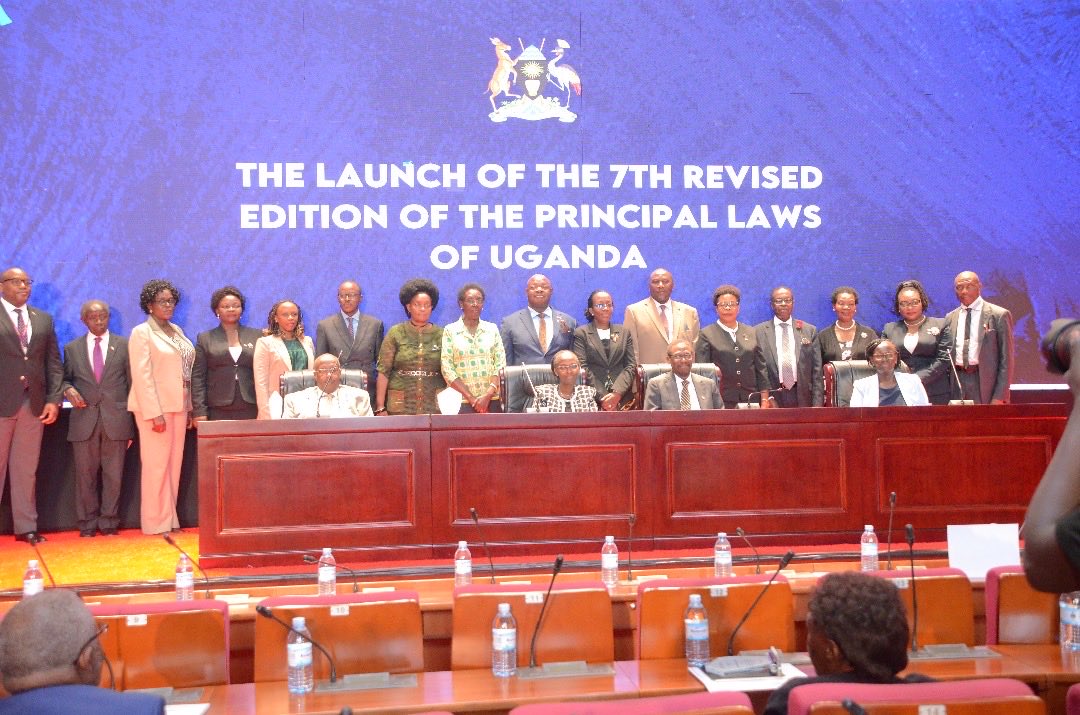The Government of Uganda has launched the 7th edition of the revised principal laws of Uganda.
The updated edition replaces the 6th edition published in 2003, which included laws functional from the time of independence until 2000. It consolidates all Acts of Parliament since 1962 until 31st December 2023, into a single statute known as “the Red Volume”.
The Attorney General, Kiryowa Kiwanuka, speaking at the launch, said the document, containing all Ugandan laws, would take effect from 1st July 2024.
Launching it at the Prime Minister’s boardroom office in Kampala on Thursday, June 27, 2024, Kiwanuka appealed to members of the legal fraternity to buy and read the revised laws, saying there is no longer any room for citing erroneous provisions of the law.
Explaining the implication of the launch of the new edition of the laws, Kiryowa said effective 1st July 2024, all lawyers on the bench, at the bar & in all sectors will be required to cite the applicable laws from this new edition.
During the launch, Kenneth Rutaremwa, the Communications Director of the Uganda Law Reform Commission (ULRC), said, “The laws are now available in print and electronic formats. The Commission has developed an online system that allows access to the laws of Uganda through a web application by visiting www.publicaitons.ulrc.go.ug and a mobile application by downloading Laws of Uganda from both the Google Play Store and the App Store to access the law easily and quickly, a hard copy of the edition costs UGX 2.5 million.”
Dr. Pamale Tibihikirra Kalyegira, under whose supervision the documents was developed, noted that upon publication, the 7th edition of the principal laws, will form the judicially notated version of the laws of Uganda.
She emphasized that the ULRC has consolidated and incorporated all amendments to Ugandan laws enacted in 2001, incorporated all laws enacted by Parliament after the year 2000, omitted obsolete, repealed and expired laws of the Statutes, and has assigned new chapter numbers to the laws, in the newly launched 7th edition of the principal laws.
She clarified that the numbering of sections and paragraphs had changed since some provisions have been omitted or added due to repeals of amendments. She said grammatical and typographical errors had also been corrected, cross references updated, footnotes and reviser notes inserted, while names of organizations, job titles and others changes in administrative and governance structures had been updated.
She explained that the commission consulted widely with various stakeholders including government ministries, departments and agencies as well as the public sector.
“The revised law does not alter or amend any substance of any enactment she explained, adding that since laws have been enacted and others repealed, the commission had assigned new chapter numbers based on the thematic areas contained in 14 volumes,” she said.
The revised edition of the Principal Laws has been arranged in 14 consolidated volumes containing different thematic areas as follows:-
Volume I Consolidates Constitutions and acts of general application.
Volume II Consolidates laws relating to administration of justice, courts, arbitration, charitable organizations and ethics in government.
Volume III Consolidates laws relating to agriculture, animals, banks, banking and financial institutions and children.
Volume IV Consolidates laws relating to commerce, industry and public officers.
Volume V Consolidates laws relating to communication, companies, partnerships and other associations and special groups.
Volume VI Consolidates laws relating to criminal law and procedures, local governments, marriage, and divorce.
Volume VII Consolidates laws relating to Arts, entertainment and recreation, energy and natural resources, Finance, national symbols and holidays.
Volume VIII Consolidates laws relating to elections, environment and foreign affairs.
Volume IX Consolidates laws relating to insurance ad statutory bodies.
Volume X Consolidates laws relating to intellectual properties, labour, and land.
Volume XI Consolidates laws relating to cultural leaders, education and libraries, estates, trusts and succession, parliament, political systems, and the President.
Volume XII Consolidates laws relating to civil law and procedures, professions and occupations, and public health.
Volume XIII Consolidates laws relating to citizenship, nationality and immigration, fish and game, security, defense, public order, and statistics.
Volume XIV Consolidates laws relating to regulated activities, taxation, transportation, and war legislation.


